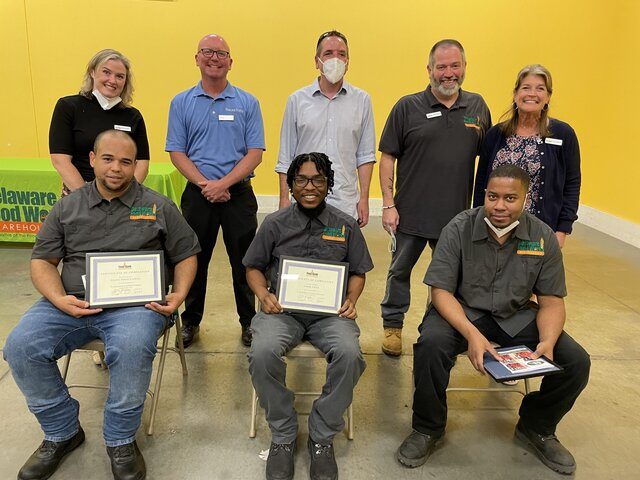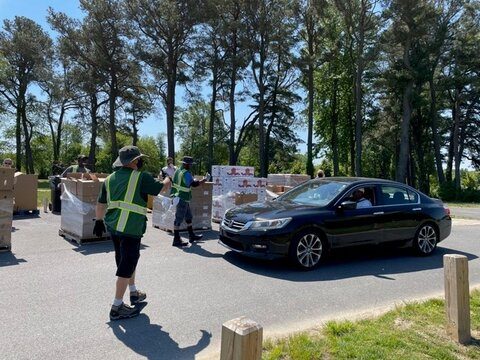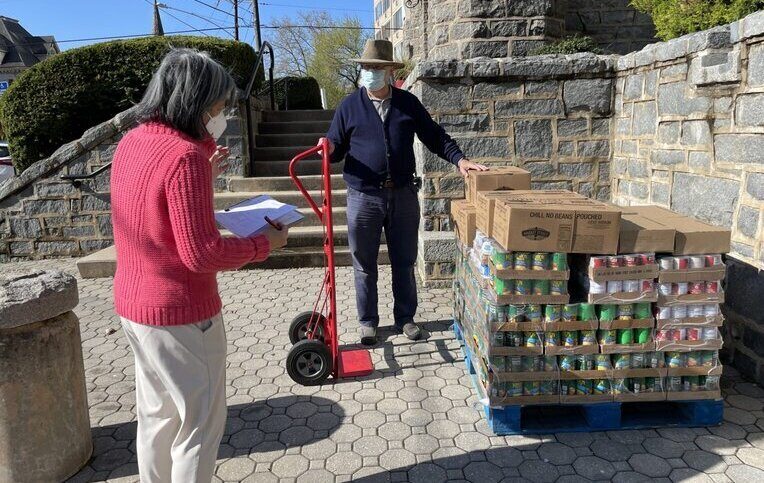The Food Bank of Delaware strives to create communities free of hunger and with its unique training programs to create second chances. Communications Director Kim Turner tells the story of “much more than a food bank.” Giant Food has supported the Food Bank of Delaware through its Community Bag and Bloomin’ 4 Good Programs.
Tell us about the Food Bank of Delaware
Our mission is to provide nutritious foods to Delawareans in need and facilitate long-term solutions to the problems of hunger and poverty through community education and advocacy. Our goal is to have communities free of hunger. Each year we distribute more than 18 million meals to people struggling with hunger.
We celebrated our 40th anniversary in 2021. The Food Bank was started by a committee at a Presbyterian Church in Wilmington. Today we’re headquartered in Newark, Delaware, with a second location in Milford to serve Kent and Sussex Counties, and we provide food and resources through a network of 578 partners.
What sets you apart from other organizations in your community?
We are so much more than just the traditional food bank giving out canned goods and non-perishable foods. We have a five-acre farm at our food bank in Newark, where we grow our own foods. We sell that food to the community to help raise money for the farm, but then we also provide that food to low-income Delawareans through our Healthy Pantry Center at no cost, so they can enjoy food that is locally grown right at the Food Bank.
We are so much more than just the traditional food bank giving out canned goods and non-perishable foods.
We have a community-supported agriculture (CSA) program through which people can purchase a share of produce. People can come to the Food Bank and pick up five to seven items that are grown on the farm and also sourced from other local growers helping us to raise money for the farm. Thanks to grants from the USDA and other organizations, we’re also able to provide those boxes of produce free of charge to people who are in need.
We also sell the produce at the cafe that we have on site, but it’s also incorporated into salads that are made and sold in the cafe. And that cafe provides a training opportunity for our culinary students. They’re preparing the grab & go salads and sandwiches and soup that we sell in that cafe. And then the cafe money is used to help support students’ scholarship. With the uptick in COVID cases here in Delaware, we have moved just to a grab & go and had to stop the dine-in, hopefully temporarily (we have reopened for sit-down dining!). But it does provide students an opportunity to work the cash register and do customer service. So, everything is tied together.
We also offer training with our Culinary School and L.O.G.I.C. (Logistics, Operations, General Warehousing, and Inventory Control) programs. Additionally, we have a summer culinary program with free tuition specifically for teens with disabilities.

Tell us a story that illustrates the good work you are doing.
We always have a ton of great stories about our culinary program, but one example in particular always sticks with me. We had a culinary student back in 2014 that came to us through a work-release program. Since our state is so small, we have a lot of opportunities to rub elbows with the governor and our federal delegation including senators and our congresswoman. We had an opportunity to cater the governor’s inauguration and this student was there serving hors d’oeuvres to the governor, senators and other dignitaries. And he said, “Here I am here rubbing elbows, serving the governor. Nobody’s looking at me any differently. Then at the end of the evening, I’m going back to jail.” He said that nobody ever looked down on him while he was in the program. After he was released, he went on to have a very successful culinary career; he’s now an executive chef here in Delaware. Our job is to light that passion for culinary, which our chefs do. And in hopes that they are not going to return to the lifestyle that led to incarceration. They are here for a second chance.
I think one of the silver linings of the pandemic is we’ve had more opportunities to do home deliveries to people who I think are probably the most vulnerable in our community, those who are truly homebound and disabled. They don’t have transportation. Thanks to partnerships with Amazon and Door Dash, we’re able to provide those home deliveries to people and the stories that we hear from people of how grateful they are to be able to get this food delivered to their homes are very rewarding. I fear that those people really were slipping through the cracks before those programs were available to them.
What is your greatest achievement or contribution to the community?
I would definitely say the contribution that we made at the height of the pandemic is what I’m most proud of. When March 2020 rolled around, nobody knew what was going to happen, but our team acted quickly and we mobilized as many people as possible to help. We had so many people coming to our mobile food pantry that we backed up traffic for miles and miles. And we had the transportation secretary on the phone with us asking, what’s going on?

At the height of the pandemic, we were serving upwards of 2,500 households. Our Department of Transportation helped us with logistics. The Delaware National Guard was out there volunteering. It really was very humbling to see everybody come together to meet that need because a lot of people went from having a job to not having a job overnight when businesses, restaurants and retail stores started to close.
So many people were coming through that line saying, “ I’ve never needed to do this before. I’ve never needed help before. What do I do?” But just to see the amount of people who wanted to roll up their sleeves and help was amazing. Our ability to respond so quickly and to meet the most urgent needs of people, I am most proud of that.
Our ability to respond so quickly and to meet the most urgent needs of people, I am most proud of that.
What do you want people to know about the Food Bank of Delaware?
I think one of the hardest things is to communicate to people that we are more than a food bank. We’re doing all these other different things. We’re providing emergency food assistance, but we’re also educating people. We’re providing training opportunities and doing outreach. We have a financial coach at the Food Bank, so we really try to address issues on all different fronts. So that would be one thing.
Oftentimes I think that low-income people get a bad reputation; people say that they’re lazy, for example. And that’s not the case. A lot of people are working hard to earn money, but they can’t make ends meet. We meet a lot of seniors who are taking care of grandkids who never expected to have to take care of their grandkids, people who are disabled and homebound who can’t work and people who are working multiple jobs. There isn’t one picture of someone who is low income. And with the pandemic, I think that was really brought to light. We did a survey and 69% of people responded that they were not utilizing a food pantry before the pandemic. So, it really impacted a lot of people.
Also, people think that they can donate canned goods or box goods only, but we also can take fresh foods as well. If you have a garden with surplus produce in the summer, our Food Bank can accept those donations. We can accept more than just non-perishable items.
How did you hear about the Giant Food Community Bag, Giving Tag and Bloomin’ 4 Good programs?
We found out about it through the contact at Giant. The in-store signage is just so important for people to know that they can purchase this bag and a donation is going to their local food bank. I think the Bloomin’ 4 Good program is a fun campaign. There are a lot of different organizations that do different types of in-store campaigns, but this is the first time I’ve seen flowers used in this way!
How will you use the funds raised from the Giant Food programs?
The funds will be used for our food distribution programs that we have running throughout the community. For every dollar we raise at the Food Bank, we can provide three meals to people in need.
Is there anything you’d like to add?
On behalf of everybody at the Food Bank, we’d like to thank Giant. They don’t have to do in-store campaigns with flowers and bags. And this is in addition to the support that Giant already provides us throughout the year, whether it’s foods or funds. We’re very grateful for their support and partnership.

Communication Director Kim Turner is a passionate advocate and representative of the Food Bank of Delaware. She joined the organization in 2008 and was named to her present position in 2012.
Published December 2, 2021

